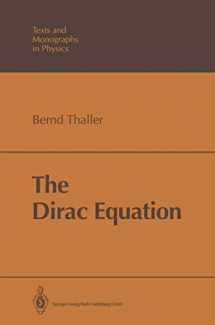
The Dirac Equation (Theoretical and Mathematical Physics)
Book details
Summary
Description
Ever since its invention in 1929 the Dirac equation has played a fundamental role in various areas of modern physics and mathematics. Its applications are so widespread that a description of all aspects cannot be done with sufficient depth within a single volume. In this book the emphasis is on the role of the Dirac equation in the relativistic quantum mechanics of spin-1/2 particles. We cover the range from the description of a single free particle to the external field problem in quantum electrodynamics. Relativistic quantum mechanics is the historical origin of the Dirac equation and has become a fixed part of the education of theoretical physicists. There are some famous textbooks covering this area. Since the appearance of these standard texts many books (both physical and mathematical) on the non relativistic Schrodinger equation have been published, but only very few on the Dirac equation. I wrote this book because I felt that a modern, comprehensive presentation of Dirac's electron theory satisfying some basic requirements of mathematical rigor was still missing.


We would LOVE it if you could help us and other readers by reviewing the book
Book review



